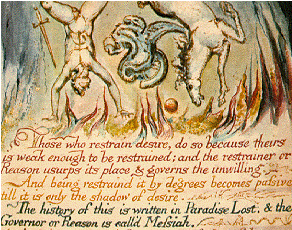
PLATE FROM "THE MARRIAGE OF HEAVEN AND HELL," BY MULTIMEDIA PIONEER WILLIAM BLAKE
I took home a book about Fortran programming but I couldn't figure out what the point was.
Word spread fast in the particular subcultural niche of New York teendom I inhabited -- science fiction fans and wargamers -- that New York University was giving some high school kids access to its computers. It was here that I encountered Star Trek -- the old game, coded in Basic, played on timeshared minicomputers like the HP-3000 or the Digital PDP-8.
It was a kind of computerized version of Battleship, dressed up in Star Trek lingo, and it was the first use of a computer that made any sense to me. It wasn't about calculations or data storage; it was about creating an alternate universe.
We soon graduated from the basement of Tisch Hall to the NYU Physics Building, on whose minicomputer we could actually get our own accounts. I still remember my first ID: J072.HS. (The "HS" suffix stood for "high school.") Here we took to a game variously called "Sumer," "Hammurabi" or "Babylon" -- a kind of primitive antecedent to "SimCity" in which you were given charge of an ancient kingdom in the Fertile Crescent. Each turn in the game represented a year of the realm's life, and each year the computer would issue its report with a ritualized address: "Hammurabi," it would say, "I beg to report..."
The player was Hammurabi. The computer was the prime minister. The machine was role-playing!
I was thrilled to learn that, once you possessed the game program "Sumer," you could do more than play it -- you could read the program, and even enhance it. Because we wanted to go beyond what the original program allowed -- because we wanted our cities to be able to multiply and fight and repel barbarian invasions and build magnificent monuments -- we had no choice: we had to learn Basic. Which of course isn't very hard.
Still, the computers of that day were frustrating; we were still working with paper on teletypes. For graphics, you were limited to ASCII art. And you could send rude comments to friends who were also signed on, but that was the full extent of the telecommunications possibilities. I lost interest.
The Basic came in handy, however, a few years later, in 1978, when I took a summer job after my freshman year of college with a political polling firm in New York City. We were polling for then-governor Hugh Carey. We were polling for then-wannabe-mayor Ed Koch. And we were polling for candidates in Venezuela that I'd never heard of. We did it all on what must have been a very primitive 64K microcomputer. (I believe it was called a "Sol," but the memory's spotty.) It did Basic, and so did I. I could write simple routines to input poll data to give us instant results in the field. Then we'd take the responses, put them on IBM punchcards, and run the batches through the mainframe at Columbia University, using a program called SPSS to analyze the results. We'd put the cards through the reader, and a while later we'd pick up a fat sheaf of wide line-printer paper.

PLATE FROM "THE MARRIAGE OF HEAVEN AND HELL," BY MULTIMEDIA PIONEER WILLIAM BLAKE
My boss wanted me to take a year off from college and keep working for him, but I had my heart and mindm set on William Blake and newspapering at the Harvard Crimson, where we were still working with punch-tape Compugraphics and manual typewriters. I think my graduating class, in 1981, was the very last echelon of American college students to type out their theses by hand rather than with computers.
When I set out as a freelance writer in 1982 and found that it wasn't so easy to pay the rent writing book and theater reviews for alternative weeklies, I put my polling skills to work at the American Lawyer magazine. Working first on Radio Shack TRS-80 boxes and, later, on the wondrously advanced first-generation IBM PC, with its two floppy drives and its antediluvian "EDLIN" editor, I managed the data for the annual "survey of summer associates" -- a project that gauged how happy law students were with the perks they received from the corporate law firms that courted them.
I also hooked up with an editor at Popular Computing who needed a piece about "Computer Law" and knew that I'd worked at the American Lawyer. I wrote a couple of pieces for the magazine, and that kept my finances afloat for a while. But I resented it; the computer universe at the time seemed devoted almost exclusively to accounting. Who cared? That was no alternate universe I wanted to spend my time in.
By the late '80s, I'd moved from the east coast to the west, and began to realize that some people were beginning to use computers again for creative ends -- and since the computers were now on all of our desktops, there was a new set of populist possibilities in the air. A book called Computers as Theater, by Brenda Laurel, put into precise words the insight I'd had years before, playing Star Trek in the NYU basement: that computers were not simply a tool for manipulating data, but a new, versatile medium for human expression.
That began to get very interesting.
 Back to
top of Scott Rosenberg's Home Page
Back to
top of Scott Rosenberg's Home Page